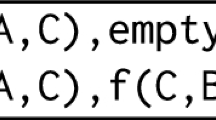Abstract
The goals of this presentation are as follows: - Review some key ideas and developments in inductive logic programming. - Show how these ideas can be used in other learning settings, and in particular for the computational scientific discovery of quantitative laws. - Encourage more research on learning in rich representations, such as relational representations and differential equations, which can be used for modeling a variety of real world problems.
This paper also appears in the Proceedings of the Nineteenth Conference on Machine Learning (ICML- 2002), published by Morgan Kaufmann.
Preview
Unable to display preview. Download preview PDF.
Similar content being viewed by others
References
De Raedt, L., editor (1996). Advances in Inductive Logic Programming. IOS Press, Amsterdam.
De Raedt, L. (1992). Interactive Theory Revision: An Inductive Logic Programming Approach. Academic Press, London.
Driessens, K., & Džeroski, S. (2002). Integrating experimentation and guidance in relational reinforcement learning. In Proc. 19th International Conference on Machine Learning (pp. 115–122). Morgan Kaufmann, San Francisco, CA.
Džeroski, S., & Todorovski, L., editors (2002). Computational Discovery of Communicable Knowledge. Springer, Berlin. Forthcoming.
Džeroski, S., De Raedt, L., & Driessens, K. (2001). Relational reinforcement learning. Machine Learning, 43: 7–52.
Džeroski, S., & Lavrač, N., editors (2001). Relational Data Mining. Springer, Berlin.
Džeroski, S., & Todorovski, L. (2001). Encoding and using domain knowledge on population dynamics in equation discovery. In L. Magnani, N. J. Nersessian, and C. Pizzi, (editors), Logical and Computational Aspects of Model-Based Reasoning. Kluwer, Dordrecht. In press.
Džeroski, S., Todorovski, L., Bratko, I., Kompare, B., & Križman, V. (1999). Equation discovery with ecological applications. In A.H. Fielding, editor, Machine Learning Methods for Ecological Applications (pp. 185–207). Kluwer, Dordrecht.
Džeroski, S., De Raedt, L., & Blockeel, H. (1998). Relational reinforcement learning. In Proc. 15th International Conference on Machine Learning (pp. 136–143). Morgan Kaufmann, San Francisco, CA.
Džeroski, S., & Todorovski, L. (1993). Discovering dynamics. In Proc. 10th International Conference on Machine Learning (pp. 97–103). Morgan Kaufmann, San Mateo, CA.
Langley, P., Sanchez, J., Todorovski, L., & Džeroski, S. (2002). Inducing process models from continuous data. In Proc. 19th International Conference on Machine Learning (pp. 347–354). Morgan Kaufmann, San Francisco, CA.
Langley, P. (2000). The computational support of scientific discovery. International Journal of Human-Computer Studies, 53: 393–410.
Langley, P., Simon, H.A., Bradshaw, G.L., & Zytkow, J. (1987). Scientific Discovery. MIT Press, Cambridge, MA.
Lavrač, N., & Džeroski, S. (1994). Inductive Logic Programming: Techniques and Applications. Ellis Horwood, Chichester. Freely available at http://www-ai.ijs.si/SasoDzeroski/ILPBook/.
Muggleton, S., editor (1992). Inductive Logic Programming. Academic Press, London.
Nedellec, C., Rouveirol, C., Ade, H., Bergadano, F., & Tausend, B. (1996). Declarative bias in inductive logic programming. In (De Raedt 1996) (pp. 82–103).
Shapiro, E. (1983). Algorithmic Program Debugging. MIT Press, Cambridge, MA.
Shrager, J., & Langley, P., editors (1990). Computational Models of Scientific Discovery and Theory Formation. Morgan Kaufmann, San Mateo, CA.
Todorovski, L., & Džeroski, S. (2001). Theory revision in equation discovery. In Proc. 4th International Conference on Discovery Science (pp. 390–400). Springer, Berlin.
Todorovski, L., Džeroski, S., Srinivasan, A., Whiteley, J., & Gavaghan, D. (2000). Discovering the structure of partial differential equations from example behavior. In Proc. 17th International Conference on Machine Learning (pp. 991–998). Morgan Kaufmann, San Francisco, CA.
Todorovski, L., Džeroski, S., & Kompare, B. (1998). Modeling and prediction of phytoplankton growth with equation discovery. Ecological Modelling 113: 71–81.
Todorovski, L., & Džeroski, S. (1997). Declarative bias in equation discovery. In Proc. 14th International Conference on Machine Learning (pp. 376–384). Morgan Kaufmann, San Francisco, CA.
Wrobel, S. (1996). First order theory refinement. In (De Raedt 1996) (pp. 14–33).
Author information
Authors and Affiliations
Editor information
Editors and Affiliations
Rights and permissions
Copyright information
© 2003 Springer-Verlag Berlin Heidelberg
About this paper
Cite this paper
Džeroski, S. (2003). Learning in Rich Representations: Inductive Logic Programming and Computational Scientific Discovery. In: Matwin, S., Sammut, C. (eds) Inductive Logic Programming. ILP 2002. Lecture Notes in Computer Science(), vol 2583. Springer, Berlin, Heidelberg. https://doi.org/10.1007/3-540-36468-4_23
Download citation
DOI: https://doi.org/10.1007/3-540-36468-4_23
Published:
Publisher Name: Springer, Berlin, Heidelberg
Print ISBN: 978-3-540-00567-4
Online ISBN: 978-3-540-36468-9
eBook Packages: Springer Book Archive



